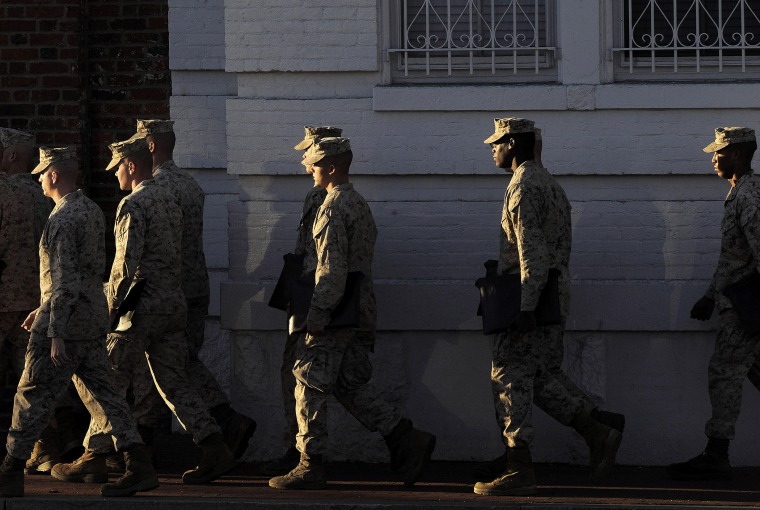Democrats' hopes of passing a major defense spending bill before the Thanksgiving recess died this week, leaving the future of the National Defense Authorization Act and a number of major proposals unclear.
With the Senate out until Dec. 9 and only a few days left to work out the differences with the House’s bill, prospects for a compromise on the $625 billion bill are uncertain. If Congress fails to pass it for the first time in 52 years -- just as it gears up for yet another budget showdown -- more than just fighter jets will be affected.
The most high-profile consequence of legislative failure can already be seen. The current impasse threatens months of work done by Democratic senators to address the problem of sexual assault in the military. A vote on two amendments was originally expected to take place on Wednesday but was ultimately derailed when Oklahoma Sen. Jim Inhofe blocked it and demanded the Senate consider a list of amendments, some of them related to issues like Iran sanctions, that would have slowed progress on the bill even further. Inhofe repeated this demand on Thursday, saying he would not support moving the bill forward without that assurance.
New York Democratic Sen. Kirsten Gillibrand's Military Justice Improvement Act would have taken serious crimes such as sexual assault out of the chain of command and placed decision-making authority over the pursuit of sexual assault cases with prosecutors. The future of a separate amendment -- offered by Missouri Democratic Sen. Claire McCaskill -- under debate this week is also in doubt. And an amendment proposed by California Democratic Sen. Barbara Boxer that would change the process for court martial preliminary hearings, called Article 32 hearings, is also in danger.
This year’s NDAA still includes several major changes to current Pentagon policy on military sexual assault. Reforms proposed by McCaskill and backed by Senate Armed Services Committee chair Carl Levin, of Michigan, would ensure that commanders will no longer be able to unilaterally overturn jury convictions, and retaliation against individuals who report a sexual assault will now be a crime.
If the NDAA is not approved, only the reforms announced by the Pentagon – which have been sharply criticized by advocates -- will go into effect.
Speaking on the Senate floor on Thursday, Levin ran through a list of consequences to not passing a bill, such as the expiration of military bonuses and no new military construction. A Defense Department spokesman confirmed that most activities would be covered under the continuing resolution Congress passed in October. Congress will have to pass a budget bill or another continuing resoltion before Jan. 15. The last attempt to pass a funding bill ended in a government shutdown.
National Military Families Association Executive Director Joyce Raezer has been trying to explain what the fight over the bill will mean for military families. "I go out and talk to families about what laws affect them," Raezer told msnbc. The size and complexity of the bill means that beyond issues like a loss of bonus pay and subsidies to school districts with large populations of military children, it's still not obvious what is in danger. "They’re not going to notice until their pay is affected or the housing they were expecting doesn’t get built or the new plane their service member was training to fly isn’t available. What we're hearing from families is just confusion."
The stalemate could also hurt the work done this year to close Guantanamo Bay, one of President Obama’s legacy issues. Levin also worked hard this year to include provisions that would ease some of the restrictions on transferring detainees from the prison, and, without those changes, what little momentum that appears to be building to close the prison could be threatened. The new provisions make it easier to transfer the 164 men still held at Guantanamo to other countries if they had been cleared, or to the U.S. for trial or medical treatment. The Obama administration has tools at its disposal to transfer detainees without congressional approval, but human rights groups see the changes as a huge step forward for closing the prison. "Detainees shouldn’t have to bear the price of congressional dysfunction for another minute," Zeke Johnson, director of Amnesty International USA's Security and Human Rights Program, told msnbc. Without the new bill, the status quo remains and efforts to ensure detainees their rights face serious opposition.
Senate leaders are still determined to pass the defense authorization bill, and Congress could pass another continuing resolution to give itself more time, but that would still delay important projects, and offices are already struggling under the weight of sequester cuts that have slashed training budgets and staffing. Hope remains that Congress will find a way to pass the defense bill, but after a year that saw new gun regulations, immigration reform, a farm bill, and more end in stalemate, success is far from guaranteed.
